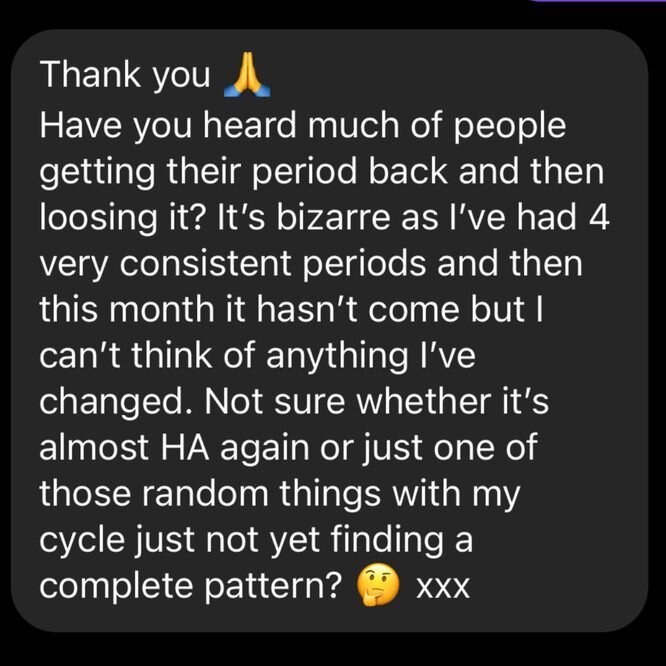I Missed My Period AGAIN: Hypothalamic Amenorrhea
In this article we’re going to discuss what it means when you’ve recovered your first cycle from HA but your second one hasn’t come yet.
This article is inspired by a question I received on Instagram.
I thought you might like to hear my answer.
Your cycle doesn't lie. There is no such thing as an atypical period for no reason. That’s why charting and tracking cycles is so valuable. It's information that can help you determine if something in your body or your lifestyle has changed.
If you're experiencing a longer cycle after you've had a consistent set of recovery cycles already (because that first 1-3 can take a while to get a rhythm and until then, you don't know what your 'normal' is) it's not spontaneous, it's connected to something.
It's easy to think that you've not changed anything significant in your lifestyle this past month, but if you really take stock of that month compared to the previous, we can find something to work with.
What’s Happened When You Missed A Period:
Exercise or movement did increase.
Maybe your daily activity feels like it hasn’t increased much, but it doesn't take a lot of extra movement to cause a shift in your cycles behaviour – especially as a post-HA'er.
So, did you have a few active weekends? Did you add some accessory work into your workout routine? Did you do more walking than usual?
Remember there is nothing “wrong” or "bad" if you observe that these things happened, life is full of ebbs and flows and your activity isn't always going to be the same. But it can provide an answer for your long or short cycle.Your stress levels went up.
Were you more stressed at work, buying a house, getting a new dog or staying at someone else's house for a while? These are all significant lifestyle changes that could impact your health.Your stress levels went down.
Remember sometimes a sudden change can be positive, too. Maybe a stressor like the above mentioned finally went away and you saw a 35 day cycle come down to 29 days and you're wondering "WHAT IS HAPPENING?! I thought I was a 35-day-cycler, something must be wrong!"
It's important to analyze that a cycle change isn't always the sign of a problem. It’s just information.Your eating changed.
Let's be real, we don't all behave exactly the same all of the time and the further into our HA recovery we get, the less diligent we naturally become with eating enough, especially when it comes to eating variety.
This can be fine, even a sign that you're on the path to leaving obsession around food behind…but it can also be happening from a place of feeling confused about where you stand now that you're on the border of HA recovery and officially recovered.
Sometimes when we've had a few periods we don't feel as connected to our goal of keeping that period and even get a little scared that the consistent cycles mean that you DEFINITELY gained a lot of weight. This makes us sneak back in the other direction a little more, hoping we can maintain a cycle and lose a little weight in the process.
Allowing these thoughts to seep in and affect our eating or exercise habits even a little bit is a quick way to see an increase in the length of your cycle or another missed period.
Dig deep on some of these – are you absolutely sure NOTHING changed, or did some small changes sneak their way in? I mean, it's natural, you can't be exactly the same every month forever.
Changes and abnormalities in life are normal. So look at your cycle through that lens and make the next best decision based on what you see happening with your cycle.
See? There is always something.
Ready to learn more about tracking your cycles with HA and post HA? I'd love to work with you on this.
I use charting as a diagnostic tool to help you determine what's happening with your cycle and come up with the next steps required to keep it running optimally.
This work is great for you if you have HA or if you’ve already recovered and want to ensure you stay that way.
On these calls we go over your HA history, create a plan to help you recover your cycle (that isn't just eat more and don't exercise), work through the mental and emotional roadblocks that recovery has and learn how to track the signs that our bodies are giving us. Learn more about working with my to get your period back!


